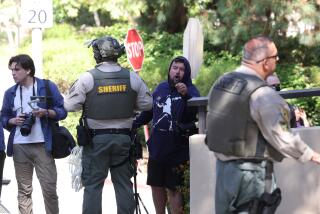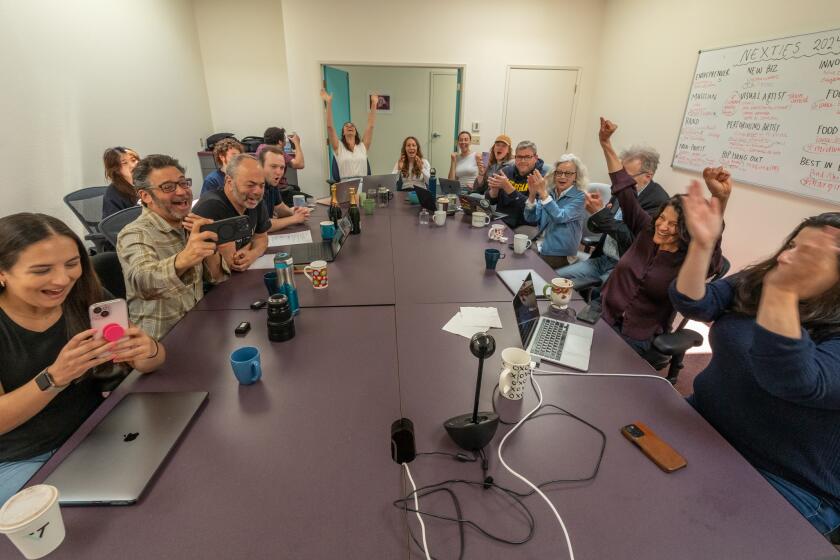OH MY, WHAT A LIFE FOR ENBERG : Rancho Santa Fe Sure Beats Picking Apples
The sun had barely cleared the mountains to the east when Dick Enberg stepped onto the tennis court at his Rancho Santa Fe estate.
The court is richly symbolic to the farm boy from Armada, Mich., who became a famous broadcaster in Los Angeles and later on NBC.
“Where I grew up, there wasn’t a court in the whole town, so this is a sign of success,” Enberg said.
Adjoining the tennis court are a two-story guest house and a pool. Up the hill is the striking home where Enberg lives with his second wife and two young daughters. The view from nearly anywhere on the estate is of fruit trees, distant hillsides and sky.
“This is paradise,” Enberg said.
The biggest problem, in fact, is the tranquility.
“It’s culturally stagnating,” Enberg said. “It’s so tough to drag yourself away to visit the symphony or something.”
Enberg, who works more than 50 sports events a year, won’t have to drag himself away for an extended period until his favorite assignment, Wimbledon, in June.
One of his broadcasting partners, Merlin Olsen, has urged the 52-year-old Enberg to look for ways to reduce his schedule to prevent burnout. Enberg has been going along with that advice. Last year, for example, he gave up the 40 Angel games he had announced on radio in 1985.
Although his career didn’t begin to flourish until the mid-1960s, Enberg has been calling baseball games since the early 1940s, when the family lived in a nearly deserted area of the San Fernando Valley.
Enberg’s mother used to stand at the kitchen window, watching her 8-year-old son stage mock games between the Pacific Coast League Angels and Hollywood Stars, delivering commentary as he swatted a ball around an empty field.
“I thought there was something wrong with that boy,” she said.
She knows better now. She sat nearby on this morning while Enberg spent two hours reminiscing.
The most pleasing element of the conversation was Enberg’s humor, generally aimed at himself. By necessity, he’s pretty much the straight man calling the action on television. Off-camera, though, he ranges from droll to downright funny.
“I always wanted to be a great athlete but I talked a better game than I played,” he said.
Not always.
As a fledgling announcer, he hardly needed a microphone, he spoke so loudly.
Despite a tendency to be a ham, Enberg hardly suspected that his mouth would be his future. Even in college, he put off a required speech class for a year. He ultimately earned an A in that course, though, thanks to a speech on skunks.
His teen-age years were spent in the hamlet of Armada--population, less than 1,000--after his family had moved there from the Valley. He played ball to avoid farm chores, such as picking apples.
He quarterbacked the Armada High School football team, but there was work even after Friday night games. He would hurry home from postgame dances to load apples in his father’s pickup for delivery to market in Detroit.
His two older children, from his first marriage, have often heard the stories of his boyhood.
“They call this my Abe Lincoln speech,” he said. “I tell them we had a one-room schoolhouse and a two-hole toilet.”
After a pause, he added the punch line.
“I guess I’ve over-compensated later in life because there are eight toilets on my property here.”
Enberg clearly relishes the finer things in life but he hasn’t lost his child-like love for games.
About the only game he doesn’t like--or announce--is golf.
“Golf is the only experience in life where, if you want to participate, you have to find your mistakes,” he said.
In Enberg’s profession, unlike some others, pain and frustration tend to be emotional rather than physical.
There was an exception, though, to that rule last year at Wimbledon. Enberg, running from center court to the studio, fell and gashed his left leg just below the knee.
To the amazement of his partner, Bud Collins, Enberg went on the air for a few minutes while a nurse wiped the blood from his leg.
During a commercial break, an available doctor--a gynecologist as it turned out--told Enberg it would take 15 minutes to numb the wound before she could stitch it.
Sounding like a man who had been reading too many stories about injured football players, Enberg snapped, “Forget the anesthetic. I don’t have 15 minutes.”
There was another untoward moment during the Wimbledon fortnight last year.
Enberg, normally a spiffy dresser, joined Collins for tea at a formal spot.
“Dick pulled a Bobby Knight on me,” Collins said. “He was wearing a sweater. They asked him to please put on a coat, which they furnished. The coat was large enough to fit Merlin (Olsen). Every time I see Dick, I ask him if he bought that coat.”
Olsen, Enberg’s sidekick on NFL telecasts, furnished a companion clothing story with a twist.
“I tend to travel in Levi’s,” he said. “Dick is usually in a three-piece suit, which makes us a contrasting picture when we arrive in tandem.
“We were in Boston once, looking for a spot to eat, and we stopped at a bar in Somerville, sort of a rough neighborhood. Across the street from the place was a funeral parlor. When the guy running the bar saw us, with Dick in his three-piece suit, he came up and asked, ‘Are you here for the wake, Mr. Enberg?’ That’s how I greet Dick now when I see him in an airport.”
Olsen and Enberg have been friends since Olsen was playing with the Rams 20 years ago. They became broadcasting partners in 1977 and their work has retained a freshness for 10 years.
“We have certainly learned to read the meter of each other’s speech and anticipate thoughts,” Olsen said. “But what’s exciting to me is that there is a genuine pleasure in working together.
“I think that adds comfort for a viewer who wants to enjoy a game. When there is animosity between broadcasters, it puts an edge on things and people don’t enjoy it.”
Enberg has developed a similarly comfortable relationship with his tennis colleague, Collins. Although he knew relatively little about the game when he first went to Wimbledon in 1979, Enberg found Collins willing to help him.
“In this business, you find some very large egos, and Bud could have said to me, ‘Sorry, I don’t have any time right now,’ ” Enberg said. “If that had happened, I might have self-destructed. You’re not allowed many unforced errors in this business. I felt very awkward. Bud really held my hand for a year.”
Collins liked Enberg because he didn’t flaunt his ego or attempt to get by on the strength of his voice.
Collins also was impressed by Enberg’s preparation, which included sitting with a variety of tennis experts and absorbing knowledge from each of them.
Another characteristic that makes Enberg easy to work with is unselfishness.
“He doesn’t allow his ego to interfere with his role, which is to let his analyst showcase what is happening,” Olsen said. “He sometimes takes a role that is almost invisible.
“You need a strong level of confidence to do that; just to climb in the booth takes a strong ego. But if you can’t control that ego, it’s a problem. I have a great appreciation for the way Dick handles it.”
Preparation is the key to handling every announcer’s nightmare--a game that turns into a rout in the opening stages.
Enberg and Olsen were in Denver one Sunday when the Broncos took a 21-0 lead against New England and Patriot quarterback Steve Grogan was knocked out, all before the first quarter was over.
“What saved us was an early-season snowstorm,” Olsen said. “It added a texture of interesting shots and gave us something to talk about. During a timeout in the fourth quarter, Dick leaned over to me and said, ‘Thank God for the blizzard.’ ”
It was raindrops, though, not snow, that figured in Enberg’s most famous act of filling time.
During a UCLA-Oregon basketball game in 1970, Oregon went into a stall early in the game and Enberg hummed “Raindrops Keep Falling on My Head.”
At the next game, the pep band played the tune and some UCLA students clamored for him to sing. At the end of the final regular-season game, Enberg nervously walked to mid-court and sang the song.
Several days later, he received a note from a music professor: “I’ve spent 30 years studying music, and you hit two notes I never heard before.”
An audience appreciates it when an announcer appears human, Enberg has discovered. Thus, he tries to come across naturally.
There have been some moments, though, that were a little too human. Once during an Angel postgame show, he forgot to pin his mike to his lapel. After more than a minute on the air, he noticed a producer gesturing to him. He had been sitting on the microphone. Enberg retrieved the mike, and went on reciting scores.
Staying composed in an embarrassing situation is the product of years of experience. There was a time, however, when Enberg wasn’t comfortable before even a small group, much less a TV audience of thousands or millions.
In fact, his vocal talent didn’t really manifest itself until he took a debate class at Central Michigan University.
One of the debaters was the public-address announcer for football and basketball games. When he graduated, Enberg applied for and was given the job.
While still in college, he earned spending money by carrying trays in dormitories for 50 cents an hour. Then a fraternity brother graduated, and Enberg applied for his job, sweeping floors at the local radio station for $1 an hour.
He felt more comfortable with his hands wrapped around a broomstick than a microphone, but agreed to audition when a station employee heard his voice.
He got the job as a weekend disc jockey, and found the hardest part was refraining from playing Elvis Presley records. This was 1955, and some radio stations weren’t ready for the Elvis craze, even if Enberg was.
Enberg was promoted when the station’s sports director left. He did a 15-minute nightly show in addition to his duties as campus P.A. man.
“I was so enthusiastic,” he said. “At the start of a basketball game, I’d make it sound like we were already in double overtime.”
Unknown to the young announcer, his father was taping every word he uttered on the air. He found the tapes years later, after his father’s death.
Uncertain about his broadcasting talent, Enberg enrolled at Indiana University’s graduate school of health science in 1957. He eventually earned a doctorate in that field.
As it happened, a Hoosier radio network was formed that year, and Enberg landed the job as play-by-play man, joined by another young announcer, Phil Jones, now White House correspondent for CBS news.
After four years as the voice of the Hoosiers at $35 a game, Enberg completed work on his Ph.D. and visited the office of the dean to inquire about a teaching job.
He didn’t get the teaching job--and is glad of it.
“I’d probably still be there, announcing games and teaching,” he said. “I needed to move on.”
He moved to Los Angeles.
A note on the bulletin board in the health science building at Indiana had caught his eye, and Enberg wound up at what was then San Fernando Valley State College, now Cal State Northridge, where he taught courses in his health science and coached baseball.
By this time he was married, and in need of extra income. In the spring of 1962, he contacted more than two dozen radio stations, with no luck. Finally, he decided to identify himself as Dr. Enberg and the secretaries at three stations put him through to their program directors.
After a few years of part-time radio broadcasting, he was hired by Channel 11 in 1964. A year later he went to KTLA for $18,000 a year.
“I felt guilty because that was triple what I made as a teacher,” he said. “Then I found out I was being paid 10% under the union minimum. I’ve had an agent since then.”
Although he had to put teaching behind him, he still carries some of the professor inside. And he is an impassioned believer in the value of education.
“Where would we be without our basic free educational system?” he said. “It’s the foundation of all that’s good in this country. In other societies, educators are the most powerful people, but that’s been diluted by our society.”
He makes charitable donations to half a dozen colleges and universities and serves as spokesman for the GTE Academic All-American football team.
TV money has changed the thinking of university presidents and athletic directors, Enberg said.
He thinks the freshman eligibility rule should be voided and favors paying student athletes $200 a month for expenses and spending money.
“I can’t cure all the problems,” he said. “That’s not my job; I’m there to report. But I try, with a subtle comment, to commend a student athlete as a worthwhile role model for young people.”
He advocates raising the public’s awareness of education through a commercial in the vein of the National Football League’s campaign for the United Way.
“I could do an ad-lib about where I would be without an education,” he said. “I could be picking apples back in Armada.”
Enberg hasn’t outgrown his roots. His father saw to that.
“He always told me he’d kick my butt if I started acting too smart,” Enberg said.
After Enberg’s second marriage, in 1983, his father moved in with the couple at their new home here. The elder Enberg was dying of cancer and was receiving treatment at a hospital in La Jolla.
“About the only time I ever saw my father cry was an hour after the birth of my daughter, Nicole, in May, 1984,” Enberg said. “He had followed Barbara’s pregnancy since its inception, and he said he felt closer to the baby than to his own children.”
Four months after the baby’s birth, the senior Enberg died.
“When he died, I recognized how much of him lives on in me,” said Enberg.
“In a span of a few months, I went through the cycle of birth and death, and I realized all of this--houses, money--is really not very important. When we die, all we leave behind is our fine art and our children.”
More to Read
Start your day right
Sign up for Essential California for news, features and recommendations from the L.A. Times and beyond in your inbox six days a week.
You may occasionally receive promotional content from the Los Angeles Times.






